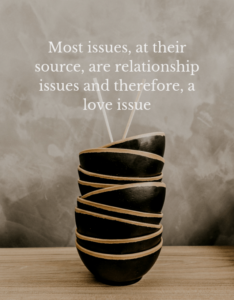《自律養生實踐家之旅387》 發自內心,成就好事

我常處在一種情境中:幾位朋友在身旁,談著他們的就醫過程,談論著那些我完全不認同的手術。他們彼此鼓勵,要「好好治療」,語氣誠懇又堅定。
這樣的場合與我的職場世界無關,我不會介入,也不會批評,只能無奈選擇尊重。
世界確實「很醫療」,這是事實。我不會在那個世界提出不同主張,也不必與深信醫療的人辯論,只與那些準備離開醫療世界、願意重新理解身體的人對話。
疾病往往存在病人自己難以相信的根源,然而在現代醫療中,病因常被忽略,病人的情緒與個性不在討論範圍,病人的思考模式,更是醫師不感興趣的領域。
在這個以醫療為信仰的世界裡,人們只重視治療的手段與權威,他們關心疾病的名稱與嚴重程度,少有人反思自己的價值觀,是否正是致病的原因。
我想談的,是「做事的目的」,那個目的,就是價值觀。
我們為什麼要做一件事?那個「為什麼」,決定了生命的品質。因為目的會形塑健康,也可能形塑疾病。
我們做每件事總有動機:為了金錢、愛情、友情、交情;為了討好、還人情債、情義相挺;為了證明實力、彰顯權力。
做事,不是為了人,就是為了事。前者是為了成全他人或滿足自己,後者是為了完成任務或達成業績。
這些目的最終只帶來兩種結果:順利或不順、成功或失敗、得意或怨懟。
人與人之間的不歡喜,多半就源於此:當事情不順,就互相指責;當事情順利,又容易爭功。一方覺得委屈,一方顯得驕傲,合作的關係便因此瓦解。
目的連結著價值觀,而價值觀與對錯無關,那是一種選擇,一種思考模式,它深深扣住一個人的存在。
我熟悉那種被目的操控的生活:不是為了錢,就是為了情。在物質主義的世界裡,這幾乎成了生活的中心。
許多疾病的根源,也正是被這些對價關係緊緊束縛。
我開始厭倦那種強烈目的性的思維模式,意識到若不脫離它,我的人生將會在原地打轉,直到終老。
誠然,我們很難完全不為情做事。我願為我所愛的人付出,也願為妻兒奉獻生命。但我逐漸明白:為愛做事,與為人做事,截然不同。
為愛做事,是不求回報的付出;是出於心底的真誠,而非外在的計算。那一刻,我明白了生命的道理:我不想為錢工作,不想成為金錢的奴隸,更不想被物慾驅使。
我要為愛而行,為生命的價值而行,為幫助他人、讓世界更美好而行。
在醫療世界之外,我們聚集了一群屬於「身體世界」的同行者。我們的理念是:為自己,也為身體。我們的信念是:遠離病痛,也遠離醫療。
價值觀相近的人,會自然聚集。一位又一位不求回報的身影在我身旁出現,我們不以世俗的標準衡量彼此,也不以傳統價值觀評斷對錯。
有時我會想:該如何回報他們?又想起他們的初衷從不為了報酬,也不為了任何目的,只是單純願意一起做對的事。
我深知,這樣「不為事、也不為人」的目的,終將吸引更多相同頻率的人。在這個世界裡,沒有怨懟,也沒有對立。
發自內心,從心出發,從學習到行動都用心。一個人成就眾人,眾人扶持一人。沒有私心,也不爭功。
不對價,是不生病的終極根源;不求回報,是健康最單純的起點。
從愛出發,以利他為目的,當這樣的團體成形,要生病,反而變得困難。
(大多數問題,在最根本的層面上,都是「關係」的問題,因此,也是「愛」的問題。)
From the Heart, Comes Good Deeds
I often find myself in situations where a few friends sit beside me, talking about their medical experiences—about surgeries I completely disagree with. They encourage each other to “take the treatment seriously,” their tone sincere and resolute.
These are not professional settings; they have nothing to do with my work. I do not intervene or argue—I can only, with a touch of helplessness, choose to respect their decisions.
The world, indeed, has become profoundly medicalized—that is a fact. I do not enter that world to present alternative viewpoints, nor do I debate with those who firmly believe in medicine. I speak only to those who have decided to step away from the medical system, those who are ready to re-understand their bodies.
Illness often originates from causes that the patient themselves can hardly believe. Yet, in modern medicine, causes are rarely examined. The patient’s emotions and personality are excluded from discussion, and their way of thinking—something doctors have little interest in—remains untouched.
In this world that worships medicine as faith, people value only the means and authority of treatment. They care about the name of their disease and its severity, but few reflect on whether their values might, in fact, be the true cause of illness.
What I wish to discuss is the purpose behind actions—and that purpose is rooted in one’s values.
Why do we do what we do? That why determines the quality of one’s life, for purpose can shape health, just as it can shape disease.
Every action is driven by motivation—money, love, friendship, obligation; the desire to please, to repay a favor, or to stand by someone out of loyalty; to prove one’s ability or to display power.
We act either for people or for things. The former aims to please others or fulfill the self; the latter seeks to complete a task or achieve a result.
And these intentions tend to end in only two ways: success or failure, harmony or resentment, pride or disappointment.
Most conflicts between people stem from this. When things go wrong, they blame each other; when things go well, they fight for credit. One side feels wronged, the other grows proud—and cooperation falls apart.
Purpose is bound to values, and values have nothing to do with right or wrong. They are a matter of choice, a way of thinking that defines one’s very existence.
I know well what it’s like to live a life controlled by purpose—driven by money, or driven by emotion. In a materialistic world, these have become the center of life.
Many illnesses also root themselves in such transactional relationships, in these constant exchanges of value and worth.
I grew tired of that goal-oriented mindset, realizing that unless I broke free from it, my life would circle endlessly in place—until the end of my days.
It is true, we can never fully detach emotion from our actions. I am willing to give for those I love; I would even give my life for my wife and children. But I have come to understand this: acting out of love is not the same as acting for someone.
To act out of love is to give without expectation—to act sincerely, from the heart, not from calculation. In that realization, I understood life’s principle: I no longer want to work for money, to become its slave, or to be driven by material desires.
I want to act for love—for the value of life itself—for the sake of helping others and making the world a little better.
Beyond the world of medicine, we have gathered a community that belongs to the world of the body. Our philosophy is simple: for ourselves, and for our bodies. Our belief: to stay away from illness, and equally, to stay away from medicine.
Those with similar values naturally come together. One by one, selfless figures appear beside me. We do not measure each other by worldly standards, nor do we judge right or wrong by conventional norms.
Sometimes I wonder how to repay them—but then I remember: they never acted for reward or recognition. Their only intention was to do the right thing, together.
I have come to see that this kind of purpose—one that is neither for people nor for things—will continue to attract others who vibrate at the same frequency. In this space, there is no resentment, no opposition.
When one acts from the heart, learning and doing with sincerity, one person’s growth uplifts many, and many in turn support the one. There is no selfishness, no competition for credit.
To live without transactions is the deepest root of health; to expect no return is its purest beginning.
When love becomes the source, and altruism the purpose, even illness finds it hard to exist.


